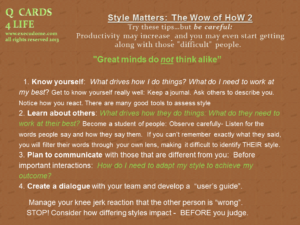Does it ever seem that your co-worker, boss or spouse are staying up nights just plotting ways to make you crazy?
Ever feel misunderstood – have the same discussions over and over with little result?
Great minds actually DON’T Think Alike…
We all have different ways of viewing and interacting with the world. Assuming that you think like me risks damage to my results and to our relationship. Every time. With the added complexity of cultural diversity, social media, and virtual communication it is even more important to connect with STYLE. Most of the time we’re lucky if we are even in the same book when dealing with other humans, never mind on the same page. Considering individual style can make your interactions more productive and more meaningful.
Using style effectively requires:
1. Know yourself: What drives how I do things? What do I need to work at my best? Get to know yourself really well: Keep a journal. Ask others to describe you. Notice how you react. There are many good tools to assess style – MBTI, Effective Intelligence and DISC are 3 popular ones.
2. Learn about others: What drives how they do things: What do they need to work at their best? Become a student of people: Observe and listen carefully- Listen for the words people say and how they say them. If you think “I can’t remember exactly what they said, but it was something like”, you will filter their words through your own lens, making it much harder to identify THEIR style.
3. Plan to communicate with those that are different from you: Before important interactions: How do I need to adapt my style to achieve my outcome?
4. Create a dialogue with your team and develop a “user’s guide” to working together.
Most importantly, accept that differences may cause you discomfort and a knee jerk reaction that the other person is “wrong.” STOP and consider what part your differing styles might play – BEFORE you judge.
There are many variations on style – here are few to get you started. Each of these common “opposites” can cause wasted effort or conflict without proper attention.
Some people freely offer their ideas and feelings out loud. They talk a lot and are admired as enthusiastic, friendly and articulate. Others like to think things through internally and offer a brief bottom line out loud. They disclose little about themselves and are often admired as good listeners, introspective and private. The talkers must take a breath and the more introspective must say at least 3 more things than they think necessary.
Some people are driven to choose a path, direct and accomplish a “right the first time” task, close it out and move on to the next. Others prefer to keep more tasks and options open, changing things until the very deadline, the ultimate “tweakers.” Discuss this difference at the beginning of a project – plan for drafts and clarify “final”.
Some people like to focus on the task and what makes sense logically in conversation, execution or planning. Others prefer to focus on building the relationship and monitoring values. Consider this difference in your planning – listen and affirm their focus and then add yours. Both matter!
Give it a try, but beware: You will likely increase trust and achievement – and you might just start getting along with those “difficult” people.
NEW from execudome! Here’s a takeaway “Q Card” to use as a reminder!

